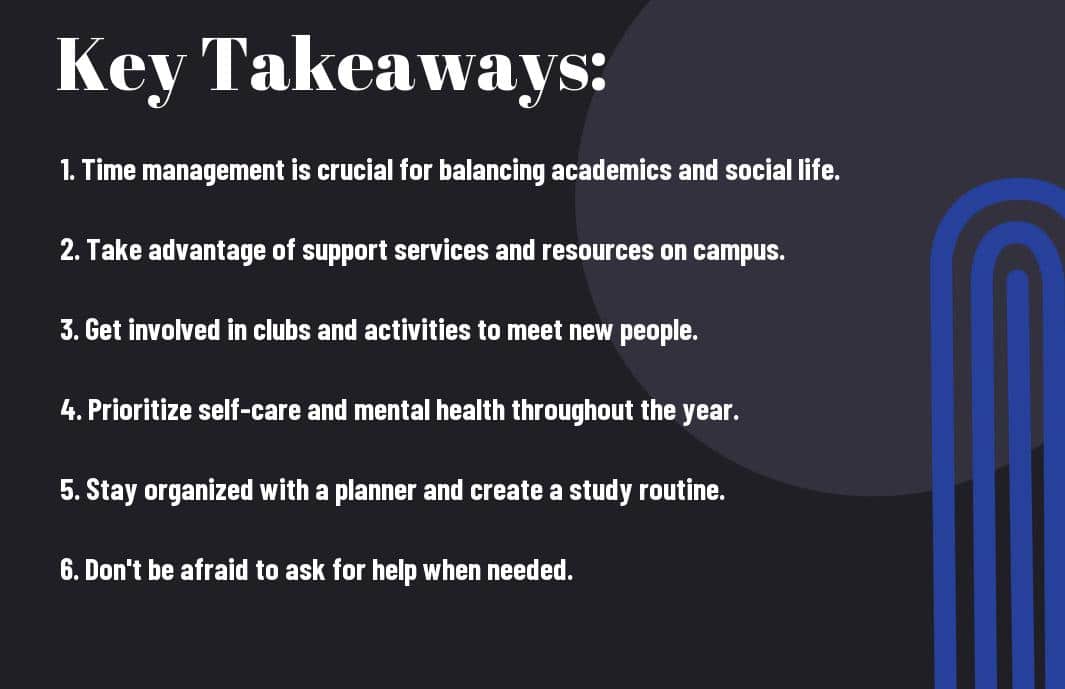Many incoming university students are overwhelmed with excitement and nerves as they launch on their academic journey. However, the first year of university can be a rollercoaster of challenges and experiences. Fear not, for I have compiled the ultimate guide to help you navigate through this crucial phase with ease and confidence. From time management to self-care, these tips will not only help you survive, but thrive in your first year at university. Strap in, because this is going to be a wild ride!
Key Takeaways:
- Stay organized: Use a planner or digital calendar to keep track of assignments, deadlines, and important events.
- Get involved: Join clubs, organizations, or sports teams to meet new people and make the most of your university experience.
- Take care of yourself: Prioritize self-care, get enough sleep, eat well, and manage your stress to maintain a healthy balance while at university.

Get Organized
Plan Schedules
For those entering the chaotic world of university, staying organized is key to success. Plan your schedules wisely and make use of tools like digital calendars or planners to keep track of classes, assignments, and social commitments. By staying on top of your schedule, you can avoid feeling overwhelmed and ensure you have enough time for everything.
Set Goals
Organized individuals set goals to guide them throughout their university journey. An efficient way to do this is by breaking down your long-term goals into smaller, manageable tasks. By setting clear objectives, you can stay focused and motivated to succeed. Recall, each small accomplishment is a step closer to your ultimate university dream.
Plus, don’t forget to periodically review and adjust your goals based on your progress and changing circumstances. Flexibility is key to adapting to the challenges and opportunities that come your way during your first year at university.
Attend Classes
Prioritize attendance
There’s one non-negotiable rule when it comes to surviving your first year at university – attend your classes religiously. Missing lectures or tutorials might seem tempting when you’re tired or overwhelmed, but showing up is key to staying on top of your coursework and building a strong academic foundation. Make it a priority to be present and engaged in every class, as every session contributes to your overall understanding and success in the course.
Engage actively
While attending classes is necessary, simply being physically present is not enough. To truly make the most of your time in the lecture hall, actively engage in the discussions and activities. This means participating in class discussions, asking questions, and taking notes actively. Treat every class as an opportunity to learn and grow, and you’ll find yourself absorbing information more effectively and retaining it in the long run.
To engage actively in your classes, make sure to sit near the front of the room, eliminate distractions such as your phone, and come prepared with questions or points to discuss. Recall, your time at university is an investment in your future, so make the most of it by immersing yourself fully in your academic experience.
Balance Commitments
Allocate time wisely
Little details matter, especially when it comes to managing your time effectively during your first year at university. Make sure to allocate time wisely for your classes, study sessions, social activities, and personal time. Use a planner or digital calendar to stay organized and on track with your commitments. Recall, time is your most valuable asset – use it wisely!
Avoid overcommitting
Time is a precious commodity, especially in your first year at university. It’s easy to get caught up in the excitement of new opportunities, clubs, and social events. However, overcommitting yourself can lead to burnout and poor academic performance. Be selective in the commitments you choose to take on, focusing on activities that align with your goals and values. Recall, it’s better to do a few things exceptionally well than to spread yourself too thin.
Commitments are a two-way street. On one hand, they can provide valuable experiences, connections, and skills. On the other hand, overcommitting can lead to stress, fatigue, and the feeling of being overwhelmed. Prioritize your commitments based on what brings you the most fulfillment and aligns with your long-term goals. Don’t be afraid to say no to opportunities that don’t serve your best interests. Your time and energy are limited resources – invest them wisely.
Make Connections
Join clubs
Now, one of the best ways to make connections and find like-minded individuals in university is by joining clubs. Whether you’re interested in sports, arts, volunteering, or any other niche, there’s bound to be a club for you. Clubs are a fantastic way to meet people with similar interests and passions, and who knows, you might just make lifelong friends in the process.
Network proactively
Little efforts can go a long way when it comes to networking in university. Attend events, join professional organizations, or even reach out to alumni on LinkedIn. Networking proactively means taking the initiative to expand your circle and build meaningful relationships that can benefit your career in the long run.
The key is to not just collect contacts, but to nurture those relationships and add value wherever you can. Take the time to get to know people, show genuine interest in their goals, and be willing to help others before expecting anything in return.
Study Effectively
Create study habits
To make the most out of your study sessions, you need to establish strong study habits from the get-go. Set a routine that works for you, whether it’s studying for a certain amount of time each day or dedicating specific days to each subject. Consistency is key when it comes to developing study habits that stick. Stay organized with a planner or digital calendar to keep track of assignments and deadlines. Keep in mind, studying effectively is not about how many hours you put in, but about how efficient those hours are.
Find quiet spaces
Assuming you can study effectively in a noisy environment is a mistake many new students make. Any distractions can hinder your productivity and learning. Seek out quiet spots on campus like the library or empty classrooms where you can focus without interruptions. Creating a peaceful study environment will help you retain information better and stay on task.
When looking for a quiet space, consider investing in noise-canceling headphones to block out any ambient noise. Additionally, finding a comfortable chair and good lighting can also contribute to your focus and overall study experience. Keep in mind, your environment plays a crucial role in your academic success, so choose wisely.

Maintain Health
Exercise regularly
Health is wealth, my friends! Regular exercise is crucial for maintaining good physical and mental health during your first year at university. It helps you stay energized, reduces stress, and improves your focus. Whether it’s hitting the gym, going for a run, or joining a fitness class, find something that you enjoy and make it a part of your routine. Consistency is key!
Eat healthily
Now, let’s talk about fueling your body with the right stuff. Healthy eating is a game-changer when it comes to staying on top of your game at university. Make sure to incorporate plenty of fruits, vegetables, whole grains, and lean proteins into your diet. Avoid loading up on processed foods and sugary snacks that can leave you feeling sluggish and unfocused.
To really drive the point home, let’s break it down. Eating healthily not only keeps your energy levels up and your mind sharp, but it also boosts your immune system and helps prevent illnesses. So, stock up on those nutrient-dense foods and don’t underestimate the power of a well-balanced diet in supporting your overall health and well-being.
Manage Finances
Budget expenses
After the initial thrill of starting university settles, the reality of managing your finances kicks in. It’s vital to set a budget and stick to it. Any unexpected expenses can quickly put a strain on your finances. Start by listing all your sources of income, including any savings, student loans, or part-time job earnings. Then, jot down all your vital expenses such as tuition fees, rent, groceries, and transportation. Make sure to allocate some funds for leisure and emergencies too!
Monitor spending
After you’ve set a budget, the next crucial step is to monitor your spending. Manage this by keeping track of every penny you spend. There are plenty of budgeting apps available that can help you categorize your expenses and see where your money is going. Having a clear view of your spending habits can help you identify areas where you can cut back. It’s easy to overspend on unnecessary items, so stay vigilant and make adjustments as needed.
Seek Help
Despite the excitement and freedom that come with starting university, many students can feel overwhelmed and unsure of where to turn for help. It’s important to remember that you are not alone in this journey. One great resource to guide you in your first year is the Top 10 Tips for 1st years!!! How to thrive at university… document. It provides valuable insights and advice on how to navigate university life successfully.
Use campus resources
There’s a plethora of campus resources available to help you succeed academically and personally. Make sure to familiarize yourself with the library, student support services, career counseling center, and health services. These resources can provide valuable assistance and support when you need it most.
Ask questions
Little do students realize the power of asking questions. Whether it’s in class, during office hours with professors, or to your peers, asking questions is crucial for learning and understanding. Don’t be afraid to seek clarification or research deeper into a topic that interests you. The more you ask, the more you will learn and grow.
Seek guidance from your professors, classmates, and campus resources when you encounter challenges or need assistance. Ask questions without hesitation to deepen your understanding and foster growth in your academic journey. Keep in mind, seeking help is a sign of strength, not weakness.
Embrace Opportunities
Try New Activities
All opportunities are a chance for growth, no matter how small they may seem. Even if it’s just joining a new club or attending a workshop, branching out from your comfort zone can lead to incredible experiences and connections. Don’t be afraid to try new things and see where they take you. You never know what passions you might discover along the way.
Take Initiative
With every new opportunity that comes your way, don’t wait for things to happen – take initiative! Whether it’s reaching out to a professor for mentorship, starting a new project with classmates, or applying for leadership positions, being proactive can set you apart and open up doors for future success. Activities like taking on leadership roles in a student organization or spearheading a community service project can not only enhance your skills but also make a positive impact on those around you.
To wrap up
Considering all points mentioned above, the key to surviving your first year at university is to stay organized, manage your time effectively, take care of your physical and mental health, and build a support network. Remember to step out of your comfort zone, embrace new opportunities, and seek help when needed. Your first year at university is a time for growth, learning, and self-discovery, so make the most of it by staying focused and motivated. With these top 10 tips in mind, you’ll be well-equipped to navigate the challenges and thrive in your new academic environment. Good luck!
FAQ
Q: What are the top 10 tips for surviving your first year at university?
A: Here are the top 10 tips to help you thrive in your first year at university!
Q: How important is time management in surviving your first year at university?
A: Time management is crucial in university life. Make a schedule, prioritize tasks, and avoid procrastination.
Q: What role does networking play in your first year at university?
A: Networking is key! Connect with peers, professors, and professionals in your field to expand your opportunities.
Q: How can one maintain a healthy work-life balance during the first year at university?
A: It’s imperative to prioritize self-care and set boundaries. Make time for both studying and activities you enjoy.
Q: What should you do if you’re feeling overwhelmed during your first year at university?
A: Reach out for help! Speak to a counselor, advisor, or trusted friend. Note, it’s okay not to be okay.
Q: How can one make the most of their first year at university academically?
A: Attend classes regularly, participate actively, and seek help when needed. Take advantage of resources like tutoring and study groups.
Q: Is it important to get involved in extracurricular activities during the first year at university?
A: Absolutely! Join clubs, sports teams, or student organizations to meet new people, gain skills, and enrich your university experience.





